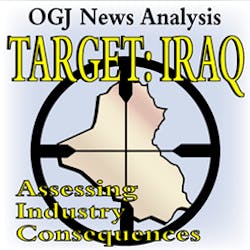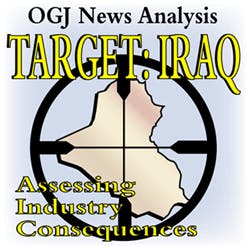Iraq rejects UN reauthorization of humanitarian aid oil sales program
Iraq has formally rejected a United Nations Security Council resolution, passed unanimously Mar. 28, that authorizes UN Sec. Gen. Kofi Annan to administer the oil-for-aid program under which Iraqi oil sales are monitored.
Declaring that the UN had broken its "contract" with Iraq, Iraqi Foreign Minister Naji Sabri said his country is under no further obligation to export any more oil under the terms of the oil-for-aid program.
The council's action allows Annan to disperse about $10 billion in humanitarian goods Iraq ordered before the conflict began and that were already approved. The UN said the program is the sole source of sustenance for 60% of the country's 27 million people. Already, relief organizations have warned about the specter of a humanitarian crisis in the country.
Resolution rejected
"Any discussion of an amendment to the memorandum of understanding and the oil-for-food program without Iraq's participation is a blatant violation of Security Council Resolution 986 (1995) and brooks no justification whatsoever," said Sabri in his letter of Mar. 31, also sent to OGJ Online.
"The program was operating with full cooperation between the government of Iraq and the Secretariat of the United Nations until the Secretariat decided on Mar. 17, 2003, to withdraw the program's staff from Iraq on the grounds of fears for the safety of international staff arising from an American-British attack on that country. There is no legal or moral basis for such a pretext."
Claiming that the UN has broken the terms of its "contract" with Iraq, Sabri stated that Baghdad is "free" of any further obligation under its terms and therefore that "Iraq will not export a single barrel of oil unless in the framework of the memorandum of understanding to which it became a party and gave its consent.
"I wish to inform you that the government of Iraq will treat any other attempt outside this framework as an operation designed to loot and steal the resources of the Iraqi people, regardless of the cover used for such an attempt. We shall consider it to be an aggressive act and a component of the American-British aggression against Iraq."
The UNSC unanimously approved the resolution adjusting the suspended oil-for-aid program to give Annan more authority to administer the operation for the subsequent 45 days (OGJ Online, Mar. 28, 2003). The program was temporarily halted on Mar. 17 after Annan ordered the withdrawal of all UN personnel from Iraq. The US-led war began on Mar. 20 (Iraqi time).
The council's resolution, subject to renewal after 45 days, authorizes Annan to carry out a variety of tasks, such as reassessing the contracts that have been approved, and covers technical issues, such as providing alternative locations for the delivery of supplies.
UN officials have identified more than 450 contracts for medicine, food, water, and sanitation supplies as priorities for shipments. The contracts are held by suppliers from about 40 countries.
The UNSC resolution gives Annan leverage over substantial funds. The UN last week reported that revenues generated from oil sales from the beginning of Phase 13 of the oil-for-aid program—covering Dec. 5, 2002-June 3, 2003—are estimated at $4.5 billion at current prices and rate of exchange.
According to Iraqi officials, however, that represents only a fraction of the funds that have accumulated under the oil-for-aid program. Iraq's Ambassador to Russia, Abbas Khalaf, on Mar. 28 said there is currently about $40 billion in the oil-for-aid accounts.
"These and other funds, which Iraq can access by exporting oil under the UN program, are enough not only to satisfy our needs but also to aid other countries, even under the blockade and armed aggression," he said.
Moot point?
Although Khalaf said that Iraq was still exporting oil via pipeline to Ceyhan, Turkey, as of Mar. 28, Sabri's threat to end Iraqi exports seemed almost academic, given the current status of the country's industry some 2 weeks after the start of the US-led war.
All exports from Iraq's Persian Gulf port of Mina al-Bakr ceased on Mar. 20 following the withdrawal of UN inspectors, while exports from the Turkish port of Ceyhan last week were said to be "intermittent" at best. Ceyhan is the endpoint of the Iraq-Turkey pipeline that starts from the giant oil fields at Kirkuk.
Interruptions are attributed partly to the lack of storage space in Ceyhan, where just 110,000 bbl of space remains out of a total storage capacity of 7.6 million bbl. But the war also has taken its toll, as Kirkuk's surrounding regions were being targeted by US-led coalition bombing raids.
The last loading from Ceyhan was on Mar. 20, and new loadings aren't expected for any time in the foreseeable future.

